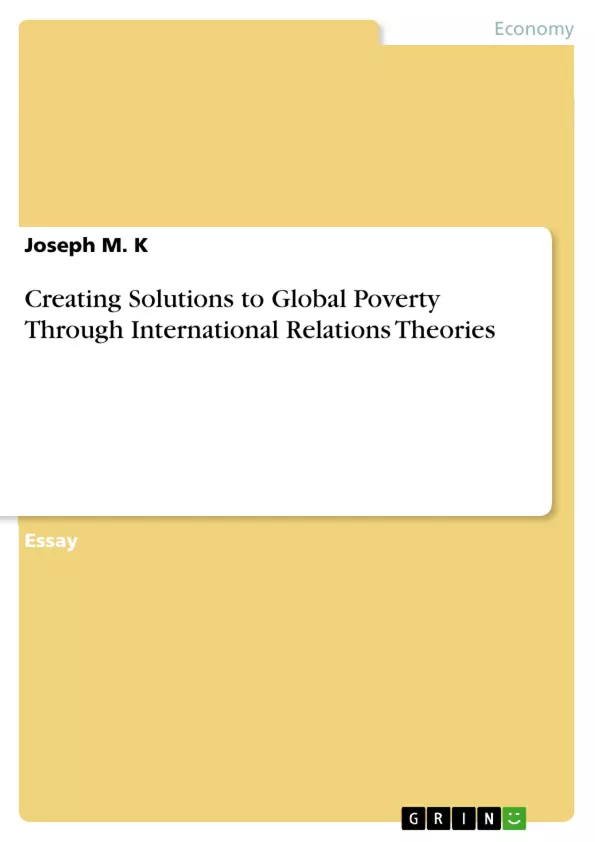This paper presents an analysis of how different international relations theories can contribute to the alleviation of global poverty. The essay examines four theories - neoliberalism, feminism, Marxism, and post-colonialism - and how they can be applied to understanding and addressing the complex issue of global poverty. The analysis argues that different perspectives are necessary to develop effective solutions for the problem, as various factors contribute to global poverty. The essay is structured to explore how each theory can be used to create solutions and how they can be combined to create a comprehensive approach. The study's main conclusion is that different international relations theories are essential in understanding global poverty and developing effective solutions, and it is crucial to have different approaches in developing solutions for the problem.
Inhaltsverzeichnis (Table of Contents)
- 1.0 Introduction
- 2.0 International Relations Theories
- 2.1 Neoliberalism
- 2.2 Feminism
- 2.3 Marxism
- 2.4 Post-colonialism
- 3.0 Conclusions and Recommendations
Zielsetzung und Themenschwerpunkte (Objectives and Key Themes)
This paper aims to analyze how various international relations theories can contribute to the alleviation of global poverty. It examines four theories - neoliberalism, feminism, Marxism, and post-colonialism - and their potential applications in understanding and addressing the complexities of global poverty. The study argues that multiple perspectives are essential for developing effective solutions, given the diverse factors contributing to the problem.
- The role of international relations theories in tackling global poverty
- The impact of neoliberal policies on poverty reduction
- Feminist perspectives on global poverty and empowerment of women
- Marxist analysis of global poverty and exploitation
- Post-colonial perspectives on the historical and contemporary causes of poverty
Zusammenfassung der Kapitel (Chapter Summaries)
The introduction sets the stage for the analysis by outlining the importance of international relations theories in addressing global poverty. It highlights the need for multiple perspectives to understand and address the complexities of the issue.
The "International Relations Theories" section delves into four different theoretical frameworks, starting with neoliberalism. It examines the theory's potential to reduce poverty through economic liberalization, highlighting both potential benefits and drawbacks. The section then explores feminist perspectives on poverty, emphasizing the disproportionate impact on women and advocating for policies that empower them.
The analysis continues with a discussion of Marxism, examining its critique of global capitalism and its emphasis on exploitation as a root cause of poverty. Lastly, the chapter explores post-colonialism, focusing on its analysis of historical and ongoing power imbalances and their impact on poverty in developing countries.
Schlüsselwörter (Keywords)
The primary keywords and focus topics include international relations theories, global poverty, neoliberalism, feminism, Marxism, post-colonialism, economic liberalization, women's empowerment, exploitation, historical power imbalances, and development.
Frequently Asked Questions
Which International Relations theories are used to analyze global poverty?
The analysis examines four main theories: neoliberalism, feminism, Marxism, and post-colonialism.
How does neoliberalism view poverty reduction?
Neoliberalism focuses on economic liberalization as a means to reduce poverty, though it also presents certain drawbacks discussed in the paper.
What is the feminist perspective on global poverty?
Feminism emphasizes the disproportionate impact of poverty on women and advocates for policies that promote women's empowerment.
What does Marxism identify as the root cause of poverty?
Marxist theory points to the exploitation inherent in global capitalism as a primary cause of global poverty.
Why are multiple IR theories necessary to solve poverty?
Because global poverty is complex and influenced by various factors, a comprehensive approach requires combining different theoretical perspectives.
- Quote paper
- Joseph M. K (Author), 2023, Creating Solutions to Global Poverty Through International Relations Theories, Munich, GRIN Verlag, https://www.hausarbeiten.de/document/1322980


